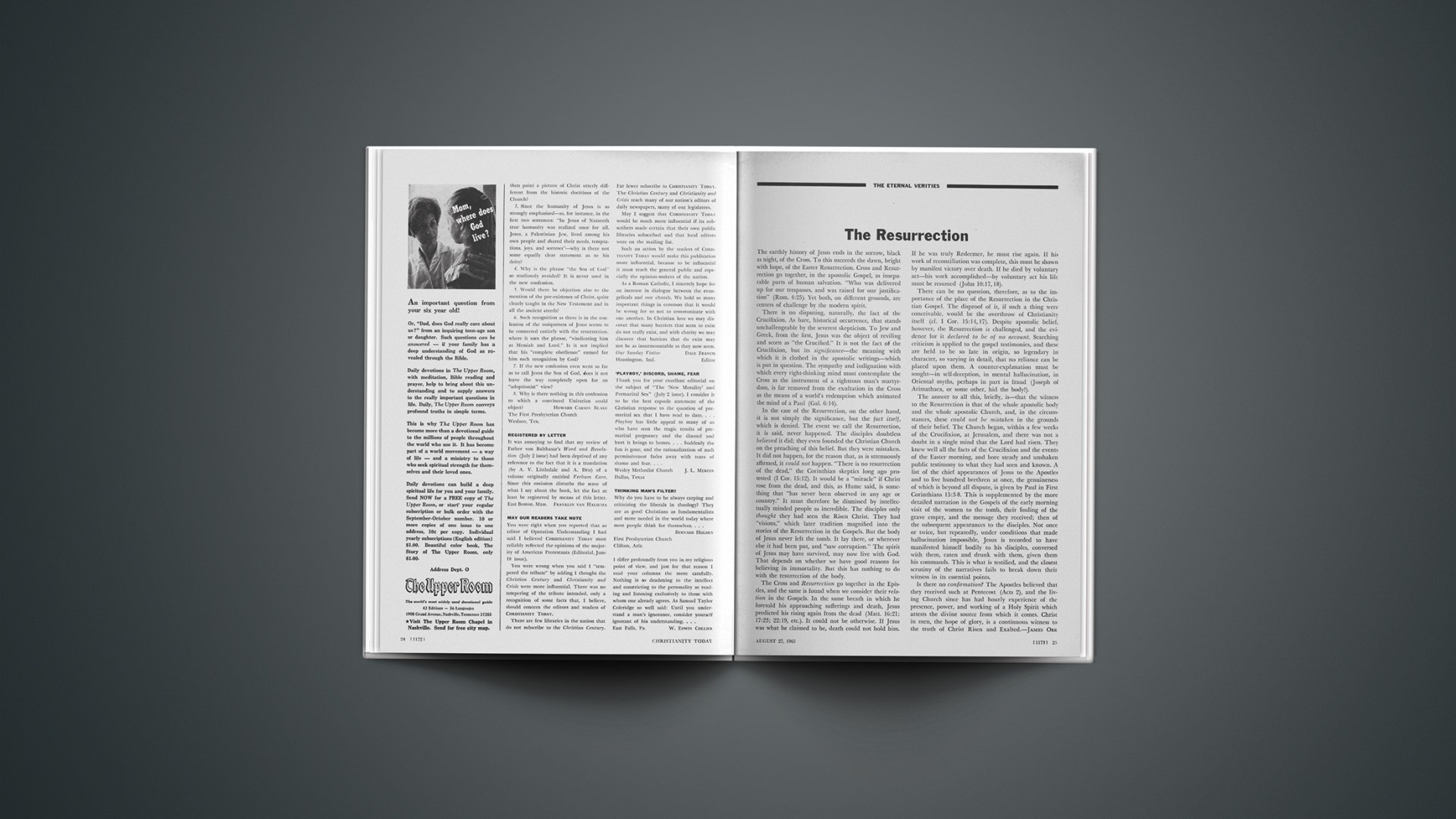The earthly history of Jesus ends in the sorrow, black as night, of the Cross. To this succeeds the dawn, bright with hope, of the Easter Resurrection. Cross and Resurrection go together, in the apostolic Gospel, as inseparable parts of human salvation. “Who was delivered up for our trespasses, and was raised for our justification” (Rom. 4:25). Yet both, on different grounds, are centers of challenge by the modern spirit.
There is no disputing, naturally, the fact of the Crucifixion. As bare, historical occurrence, that stands unchallengeable by the severest skepticism. To Jew and Greek, from the first, Jesus was the object of reviling and scorn as “the Crucified.” It is not the fact of the Crucifixion, but its significance—the meaning with which it is clothed in the apostolic writings—which is put in question. The sympathy and indignation with which every right-thinking mind must contemplate the Cross as the instrument of a righteous man’s martyrdom, is far removed from the exultation in the Cross as the means of a world’s redemption which animated the mind of a Paul (Gal. 6:14).
In the case of the Resurrection, on the other hand, it is not simply the significance, but the fact itself, which is denied. The event we call the Resurrection, it is said, never happened. The disciples doubtless believed it did; they even founded the Christian Church on the preaching of this belief. But they were mistaken. It did not happen, for the reason that, as is strenuously affirmed, it could not happen. “There is no resurrection of the dead,” the Corinthian skeptics long ago protested (1 Cor. 15:12). It would be a “miracle” if Christ rose from the dead, and this, as Hume said, is something that “has never been observed in any age or country.” It must therefore be dismissed by intellectually minded people as incredible. The disciples only thought they had seen the Risen Christ. They had “visions,” which later tradition magnified into the stories of the Resurrection in the Gospels. But the body of Jesus never left the tomb. It lay there, or wherever else it had been put, and “saw corruption.” The spirit of Jesus may have survived, may now live with God. That depends on whether we have good reasons for believing in immortality. But this has nothing to do with the resurrection of the body.
The Cross and Resurrection go together in the Epistles, and the same is found when we consider their relation in the Gospels. In the same breath in which he foretold his approaching sufferings and death, Jesus predicted his rising again from the dead (Matt. 16:21; 17:23; 22:19, etc.). It could not be otherwise. If Jesus was what he claimed to be, death could not hold him.
If he was truly Redeemer, he must rise again. If his work of reconciliation was complete, this must be shown by manifest victory over death. If he died by voluntary act—his work accomplished—by voluntary act his life must be resumed (John 10:17, 18).
There can be no question, therefore, as to the importance of the place of the Resurrection in the Christian Gospel. The disproof of it, if such a thing were conceivable, would be the overthrow of Christianity itself (cf. 1 Cor. 15:14, 17). Despite apostolic belief, however, the Resurrection is challenged, and the evidence for it declared to be of no account. Searching criticism is applied to the gospel testimonies, and these are held to be so late in origin, so legendary in character, so varying in detail, that no reliance can be placed upon them. A counter-explanation must be sought—in self-deception, in mental hallucination, in Oriental myths, perhaps in part in fraud (Joseph of Arimathaea, or some other, hid the body!).
The answer to all this, briefly, is—that the witness to the Resurrection is that of the whole apostolic body and the whole apostolic Church, and, in the circumstances, these could not be mistaken in the grounds of their belief. The Church began, within a few weeks of the Crucifixion, at Jerusalem, and there was not a doubt in a single mind that the Lord had risen. They knew well all the facts of the Crucifixion and the events of the Easter morning, and bore steady and unshaken public testimony to what they had seen and known. A list of the chief appearances of Jesus to the Apostles and to five hundred brethren at once, the genuineness of which is beyond all dispute, is given by Paul in First Corinthians 15:3–8. This is supplemented by the more detailed narration in the Gospels of the early morning visit of the women to the tomb, their finding of the grave empty, and the message they received; then of the subsequent appearances to the disciples. Not once or twice, but repeatedly, under conditions that made hallucination impossible, Jesus is recorded to have manifested himself bodily to his disciples, conversed with them, eaten and drunk with them, given them his commands. This is what is testified, and the closest scrutiny of the narratives fails to break down their witness in its essential points.
Is there no confirmation? The Apostles believed that they received such at Pentecost (Acts 2), and the living Church since has had hourly experience of the presence, power, and working of a Holy Spirit which attests the divine source from which it comes. Christ in men, the hope of glory, is a continuous witness to the truth of Christ Risen and Exalted.—JAMES ORR










